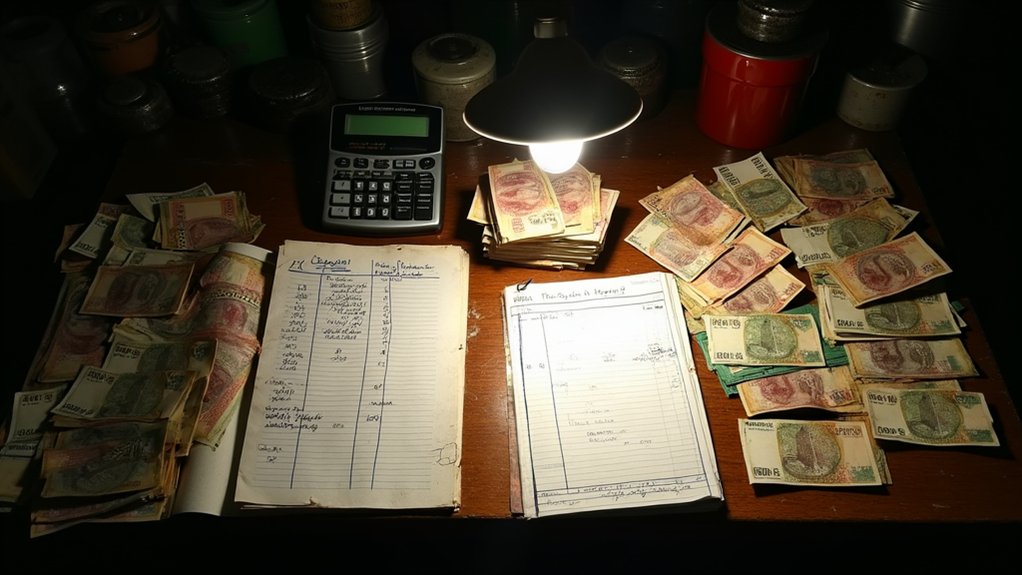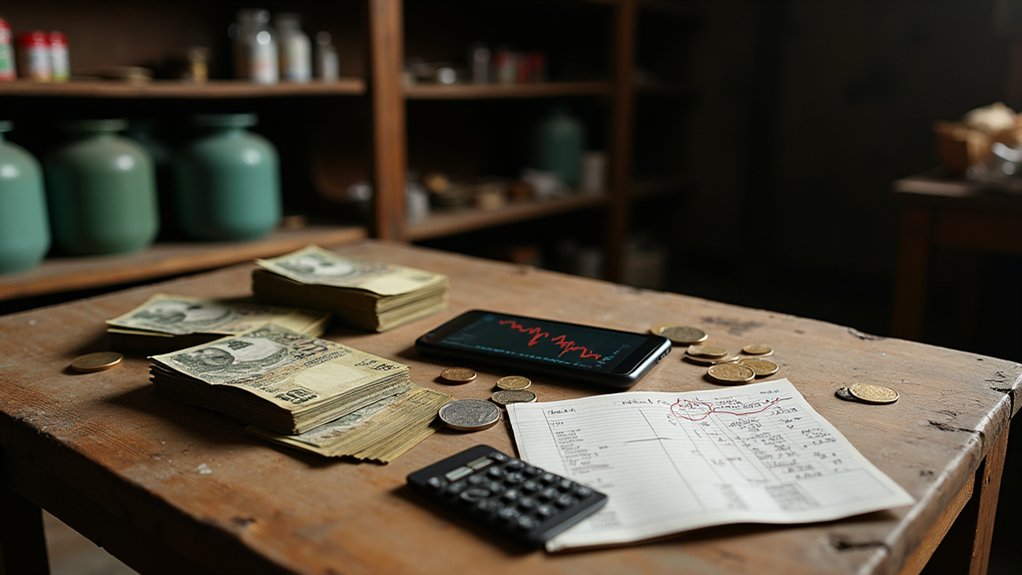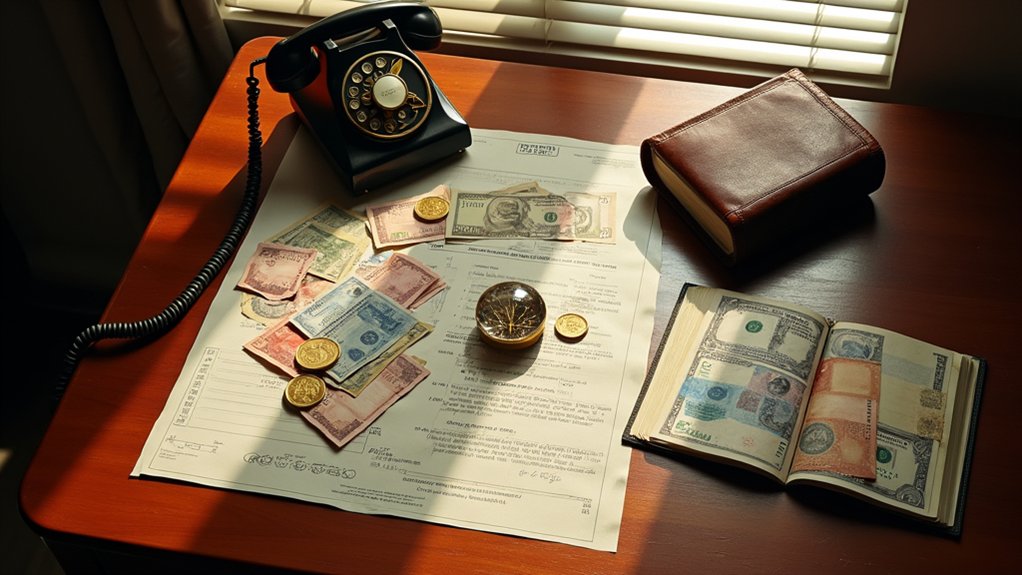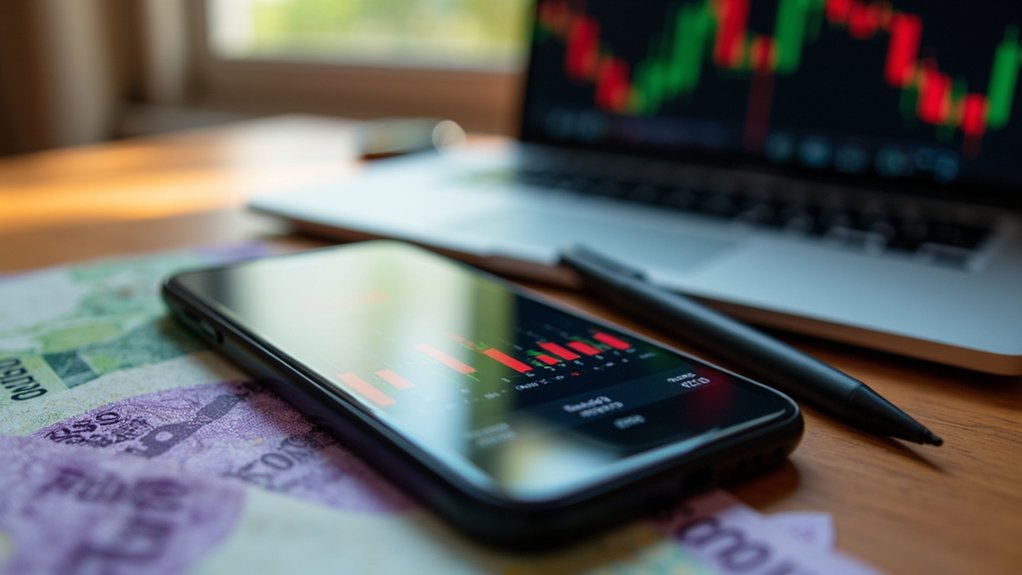Forex trading in Burundi occupies a frustrating legal gray zone—not explicitly illegal, but operating without clear rules, dedicated regulators, or a single licensed local broker. The Central Bank oversees currency controls and exchange bureaus but largely ignores retail platform activity, leaving thousands of Burundians to access international brokers through MT4 and MT5 while navigating 39% inflation, chronic foreign currency shortages, and a strict cryptocurrency ban that carries up to seven years in prison. Meanwhile, tax requirements remain maddeningly vague and scammers exploit the regulatory vacuum through social media. The full picture reveals how traders actually operate in this constrained environment.
Quick Facts That Matter
- Forex trading is technically permitted but operates in a regulatory grey zone with no dedicated retail oversight or domestic licensing framework.
- Burundians trade through international brokers on MT4/MT5 platforms since no local brokers exist, relying on foreign credentials for legitimacy.
- Severe currency scarcity, 39% inflation, and depleted reserves create persistent market volatility and constrain the practical trading environment.
- Cryptocurrency trading is illegal with penalties up to seven years imprisonment, though over 20,000 people reportedly trade Bitcoin.
- Widespread forex scams exploit regulatory ambiguity through social media, while tax obligations remain frustratingly vague with unclear official guidance.
Overview: Forex Trading in Burundi

Against a backdrop of mounting economic pressures, forex trading in Burundi operates within one of Africa's most challenging currency environments. The Burundian Franc hit 2,949.64 per dollar in October 2025. Not great.
A dual exchange rate system—official versus parallel—creates massive distortions. The premium doubled in 2024 before stabilizing early 2025.
Foreign reserves sit dangerously low, triggering fuel shortages and supply chain chaos. Inflation averaged 39 percent through early 2025. The central bank holds interest rates steady at 12.00%, even as inflation remains elevated. Central banks across the region employ currency exchange interventions to manage volatility and stabilize their forex markets.
The currency depreciated 3.39% year-over-year through August 2025. Retail traders navigate this volatility through online platforms, but the structural headwinds are brutal.
The economic fundamentals remain shaky at best. GDP growth reached 3.5% in 2024, yet potential remains undermined by macroeconomic instability and structural weaknesses.
Is Forex Trading Legal in Burundi?

Maneuvering the legal status of forex trading in Burundi requires cutting through a fog of regulatory ambiguity. Forex trading? Technically permitted. Clear regulations? Not so much. No specific laws exist for forex trading itself—just general financial regulations covering transactions. The Central Bank of Burundi maintains oversight, but there's no dedicated forex regulator.
Here's where it gets interesting: Bitcoin and virtual currencies are completely illegal, with fines hitting BIF 500,000,000 and prison sentences stretching to seven years. Yet over 20,000 people trade Bitcoin anyway. Governor Jean Ciza issued a warning in September 2019 emphasizing that virtual currencies are not legal tender and carry no government guarantees. Meanwhile, international forex brokers regulated by FCA, ASIC, or CySEC remain accessible to Burundian traders. Choosing a regulated broker enhances security and transparency in an otherwise murky regulatory landscape. Understanding the compliance requirements that govern foreign exchange activities helps traders navigate these complex regulatory waters more effectively.
Who Regulates Forex Trading in Burundi?

In Burundi's forex landscape, regulation exists in name more than practice. There's no dedicated forex regulatory body overseeing retail trading. The Bank of the Republic of Burundi handles currency matters and cracked down on black market trading in 2019, arresting 40 traders. But for everyday forex traders? They're on their own.
The practical reality:
- No domestic forex licensing framework exists
- International brokers need FCA, ASIC, or CySEC approval
- Central bank focuses on currency controls and exchange bureaus
- Enforcement targets unauthorized street traders, not retail platforms
Traders rely entirely on their broker's foreign credentials. The central bank's September 17 reforms required exchange bureaus to download new tracking software and increased minimum capital requirements. That's it.
Given the local regulatory gap, Burundian investors increasingly seek brokers with international approvals for added security when participating in global currency markets. Understanding broker regulations in neighboring countries can provide useful context for assessing the safety of different trading platforms.
How Forex Trading Works in Burundi

Understanding the regulatory landscape means little without grasping how traders actually execute transactions on the ground.
Burundian traders access forex markets through international brokers—platforms like MT4 and MT5. No local brokers exist. Traders open accounts online, deposit funds, and trade currency pairs remotely. Demo accounts let beginners practice without risking real money. Minimum deposits vary by broker, making entry flexible.
The Central Bank's recent policy shifts have gradually opened doors for forex bureau operations, though foreign currency scarcity since 2016 remains a persistent headache. Black market crackdowns arrested 40 traders. It's a tight spot. Unlike Burundi, jurisdictions with established frameworks offer licensed brokers operating under clear regulatory supervision, providing traders with additional protections and oversight.
Best Time to Trade from Burundi

Timing shapes everything in forex—and Burundi's GMT+2 position puts traders in a peculiar sweet spot.
The London-New York overlap window from 3:00 PM to 7:00 PM local time delivers the heaviest volume. That's when EUR/USD and GBP/USD actually move.
Session overlaps worth noting:
- Sydney-Tokyo (2:00 AM–9:00 AM): moderate action
- London-Tokyo (10:00 AM–11:00 AM): brief but active
- London-New York (3:00 PM–7:00 PM): peak liquidity
- New York solo (7:00 PM–midnight): still profitable
Early morning? Dead quiet.
Afternoon through evening? That's the game.
No daylight saving nonsense in Burundi either—one less headache.
Different currency pair liquidity patterns mean some pairs trade better during specific sessions than others.
Payments, Deposits and Withdrawals in Burundi
Moving money in and out of forex accounts from Burundi isn't rocket science—but it's not exactly frictionless either.
Bank transfers work. Cards work. E-wallets like Skrill and Neteller show up at brokers such as XM and XTB. Mobile money‘s a thing here too, especially outside cities where banks are scarce.
Mobile money fills the gaps where traditional banking infrastructure hasn't reached yet—especially in rural Burundi.
Minimum deposits range wildly—Pepperstone wants zero, IC Markets asks for $200.
Services like Afriex and MoneyGram handle international transfers, with varying speeds and fees.
The local payment infrastructure's improving, gradually. Real-time processing exists. QR codes are spreading. It's functional, not magical.
When withdrawing profits, traders should prioritize secure transfer methods and verify recipient details to minimize fees and protect against fraud.
Taxes, Reporting and Money Rules in Burundi
Getting paid is one thing. Keeping it legal? That's where Burundi's forex rules get interesting. The Foreign Exchange Regulation governs everything—literally everything—related to currency movement. The central bank watches over it all.
Here's what matters:
- Foreign currency accounts are allowed for residents and non-residents under Article 59
- Cross-border remittance restrictions hit in January 2020, then vanished October 2022
- Forex bureaus need BRB approval and $50,000 minimum capital
- Tax specifics? The available info stays frustratingly vague
The regulation exists. Enforcement happens. Details on actual tax rates and reporting requirements remain unclear from official sources. Central banks like Bank Al-Maghrib demonstrate how currency reserve management and exchange rate intervention strategies can provide regulatory frameworks that other African nations often reference.
Forex Trading Scams and Risks in Burundi
Forex scams don't respect borders, and Burundi hasn't escaped the mess. Fraudsters operating from call centers in Cyprus, Israel, Ukraine, the Philippines, and a dozen other countries target Burundians through Facebook, TikTok, Instagram, and Telegram. Thirty-two percent of forex scams now spread via social media.
These con artists pose as expert traders, promise ridiculous returns, then redirect investor money through tangled financial pathways instead of making actual trades. Funds disappear fast.
Burundi's parallel forex markets and depleted foreign reserves after the 2015 crisis created extra vulnerabilities. The central bank banned all cryptocurrency trading after citizens got burned.
Quick Q and A
Can I Trade Forex in Burundi if I Don't Have a Bank Account?
Trading forex in Burundi without a bank account is extremely difficult. Regulated brokers and authorized intermediaries require bank accounts for deposits and withdrawals. While forex bureaux exist, they primarily facilitate currency exchange rather than online retail forex trading platforms.
Do Burundian Mobile Money Platforms Allow Deposits to Forex Brokers?
Current evidence shows EcoCash and Lumicash are not directly integrated with international forex brokers. Traders must use alternative methods like cryptocurrency, e-wallets (Skrill, Neteller), bank transfers, or card payments to fund forex accounts in Burundi.
What Internet Speed Is Needed for Reliable Forex Trading in Burundi?
A minimum of 1-2 Mbps is sufficient for reliable forex trading, though 5+ Mbps is recommended for smoother chart updates and execution. Traders in Burundi should prioritize connection stability over raw speed to avoid order disruptions.
Are There Local Forex Trading Communities or Mentors in Burundi?
Yes, local forex trading communities exist in Burundi, including the Forex Community Burundi YouTube channel and networking groups in Bujumbura. Forex Trading Masterclass courses offer mentorship, while local financial experts provide guidance on regional market insights and trading strategies.
Can I Open a Forex Account Using a Burundian Passport Only?
Most international forex brokers accept Burundian passports for account opening, but typically require supplementary proof of address documentation such as utility bills or bank statements. Passport-only opening is rarely sufficient; additional verification documents are standard regulatory requirements across platforms.
The Bottom Line
Forex trading in Burundi exists in a gray zone—no clear laws, no local regulation, sketchy broker access. Traders are doing it anyway, steering through payment headaches and withdrawal nightmares. The infrastructure barely supports it. Scams are rampant. Tax rules? Unclear. It's high-risk territory where most people lose money, yet the appeal of quick profits keeps pulling people in. Reality check: this isn't a get-rich scheme. It's complicated, risky, and poorly supported. Proceed with extreme caution.










